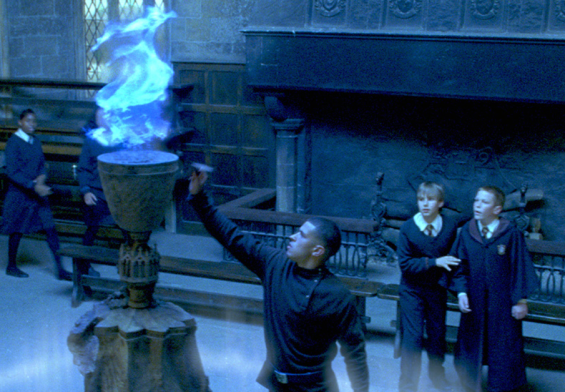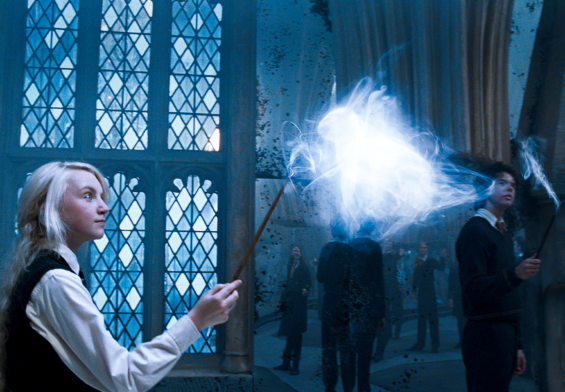
Magic in Harry Potter feels like a dream. Wands wave. Spells fly. Doors open. Yet behind all this wonder, there are quiet rules. Rules that most readers miss. Rules that shape the wizarding world in ways you may not notice at first.
So let us kick off this journey. You will discover eight hidden rules of magic. Each one is simple. Each one makes the story richer. Think of them as secret threads woven into the big cloth of Harry Potter.
I still remember reading the books as a child. I once tried to whisper “Alohomora” to my locked school cupboard. Of course, nothing happened. But it made me wonder. What if magic had rules we never saw?
Recommended for You:- Why Unicorn Blood Stayed So Rare and Sacred—A Magical Secret
- Did the Marauder’s Map Hold More Spells Than We Knew? Shocking Truths Uncovered!
- Did Voldemort Even Know About the Deathly Hallows?
- The Real Reason Dumbledore Never Became Master of Death
Rule 1: Magic Needs Focus
Magic is not just about saying words. It needs focus. Wizards must think clearly. Their mind guides the spell.
You see this when Harry tries to summon his broom in Goblet of Fire. He shouts “Accio Firebolt.” But it works only because he pictures the broom in his head. Without focus, spells fail.
So magic is like aiming an arrow. The wand is the bow. The mind is the hand that steadies it.
Example: Think of when you try to remember a math answer. If your mind wanders, you forget. Magic works the same way.
Rule 2: Magic Has Limits
Magic looks endless. But it has limits. Wizards cannot do everything.
For example, food cannot be created from nothing. Hermione explains this in Deathly Hallows. You can multiply food. You can summon food. But you cannot make food appear out of thin air.
This rule keeps magic grounded. It stops wizards from becoming gods. It reminds us that even in a world of spells, nature has power.
So next time you read about a feast at Hogwarts, remember. Someone cooked it first.
Rule 3: Magic Needs Tools
Wizards need wands. Potions need cauldrons. Flying needs broomsticks.
Magic is not free-floating. It often needs tools. A wand channels energy. A potion mixes ingredients. A broom carries weight.
This rule shows that magic is practical. It is like electricity. You need wires, bulbs, plus switches to use it.
Example: Harry cannot cast spells properly without his wand. Even Dumbledore, the greatest wizard, uses one.
So tools are part of the hidden system. Without them, magic is weak.
Rule 4: Magic Obeys Emotion
Magic listens to feelings. Anger, fear, joy. All shape spells.
Think of Harry in Order of the Phoenix. His Patronus grows stronger when he thinks of happy memories. But when he feels despair, it fades.
This rule makes magic human. It ties power to heart.
Example: When Snape teaches Occlumency, he tells Harry to control emotions. Without control, Voldemort can enter his mind.
So emotions are not just background. They are fuel.
Rule 5: Magic Respects Knowledge
Magic rewards learning. Spells are like recipes. You must know the words. You must know the movements.
Hermione shines because she studies. She reads books. She practices. That is why her spells rarely fail.
This rule shows that magic is not luck. It is skill.
Example: Ron struggles with spells because he does not study as much. His wand work is clumsy.
So knowledge is power. In the wizarding world, books are as important as wands.
Rule 6: Magic Can Backfire
Magic is risky. If you use it wrong, it backfires.
Think of Ron in Chamber of Secrets. His broken wand makes spells rebound. He tries “Eat slugs.” Instead, he vomits slugs himself.
This rule teaches caution. Magic is not a toy.
Example: Spells like “Sectumsempra” are dangerous. Harry uses it without knowing. Draco bleeds badly.
So magic is like fire. Helpful when controlled. Harmful when careless.
Rule 7: Magic Follows Nature
Magic bends nature. But it does not break it.
For example, time travel in Prisoner of Azkaban follows loops. You cannot change the past. You can only fulfill it.
This rule keeps magic logical. It prevents chaos.
Example: Buckbeak survives because Harry and Hermione save him. But they were always part of that timeline.
So magic respects nature’s flow. It dances with it, not against it.
Rule 8: Magic Demands Balance
Magic has balance. Dark spells drain. Light spells heal.
Think of Horcruxes. They give immortality. But they tear the soul. Balance is broken.
This rule shows that every spell has cost. Nothing is free.
Example: Resurrection Stone brings back shadows, not real people. It gives comfort but not true life.
So balance is the final hidden law. Magic gives. Magic takes.
Why These Rules Matter
You may wonder. Why care about hidden rules?
Because they make the story real. They explain why wizards struggle. They show why Hogwarts teaches lessons. They remind us that even in fantasy, rules guide life.
Without rules, magic would be random. With rules, it feels believable.
Relatable Examples
Think of cricket. Even the best batsman follows rules. He cannot hit the ball twice. He cannot block the stumps with his hand.
Magic is similar. Rules keep it fair.
Or think of cooking. You cannot bake a cake without flour. You cannot fry without oil. Magic too needs ingredients.
Personal Note
I once tried to learn card tricks. I thought it was pure magic. Later I found it was practice plus rules. That made me respect magicians more.
Reading Harry Potter feels the same. Behind the wonder, there is discipline.
The Bigger Picture
These eight rules show that J.K. Rowling built a deep world. She did not just throw spells around. She gave them structure.
That is why fans still discuss theories. That is why Hogwarts feels alive.
So when you read again, look closer. Notice the limits. Notice the balance.
Final Thoughts
Magic in Harry Potter is more than spells. It is a system. It has rules. Some are clear. Some are hidden.
You now know eight hidden rules. Focus. Limits. Tools. Emotion. Knowledge. Risk. Nature. Balance.
Each one adds depth. Each one makes the wizarding world shine.
So next time you open the book, read with fresh eyes. Spot the rules. Share them with friends.
Magic is fun. But rules make it meaningful.
If you enjoyed this theory, try sharing it with fellow fans. Discuss it after rewatching the movies. Or read the books again with these rules in mind.
You may spot even more secrets. And who knows. Maybe you will write your own theory one day.



